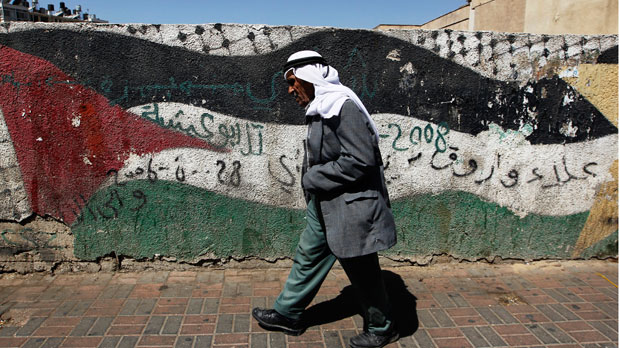Palestinians bid for statehood
As Palestinian negotiators head to the United Nations to push their bid for formal recognition as a state, Jonathan Rugman reports on Palestinians celebrating in the streets in anticipation.
The stage is set for a showdown on Friday when Palestinian President Mahmoud Abbas will request a formal vote at the UN security council; the first step on the road to full statehood. He’ll be calling for an independent state based on the 1967 borders, which includes Gaza, the West Bank and East Jerusalem, while outlawing Jewish settlements set up inside disputed areas. It’s a risky move, but Abbas has declared he won’t be swayed: “We decided to take this step and all hell has broken out against us”.
No progress
Prospects of an end to the impasse seem bleak: tonight Britain’s foreign secretary William Hague warned that the Quartet of peace negotiators – from the United States, Russia, the European Union and the UN – had made “no progress” on a statement to avoid a showdown over the statehood issue.
Israel wants talks
Israel’s Prime Minister Benjamin Netanyahu, who arrives in New York on Wednesday, has called the Palestinian move provocative – and wants direct peace negotiations instead. “Unilateral measures are not the way to advance peace between us”, he said. The United States is also trying to persuade the two sides back into talks – warning that if any Palestinian application reaches the Security Council, they’ll veto it.
All hell has broken out against us. Mahmoud Abbas, Palestinian President
Even France, which has historically backed the Palestinian cause, has expressed concerns about the prospect of a showdown. Foreign Minister Alan Juppe insisting “we have to avoid such a confrontation. We have to find a balanced solution…the only solution is to resume talks”.
International law
Under international law, defined by the 1933 Montevideo Convention on the Rights and Duties of States, a state is required to have a permanent population, a defined territory, government, and the capacity to enter into relations with the other states. Palestine pretty much meets that criteria; at least as much as South Sudan which was admitted as a full UN member in July.

Confrontation with Hamas?
But given the US veto threat, a full push for statehood is pretty much certain to fail. Instead, the Palestinians could go to the General Assembly, and seek the neccessary two thirds majority to be upgraded to a ‘non-member state’. That, though, would risk confrontation with Hamas, the militant group which controls the Gaza strip. They’ve already warned Abbas that such a move would accede too much ground to Israel and “deprive the Palestinian people from their right to come back to their homeland”.
Risks on both sides
The risks are clearly enormous on both sides – as experts freely recognise. Robert Danin, from the Council of Foreign Relations, points out that a unilateral step by Abbas could prove a very expensive mistake: “by adopting a publicly confrontational approach toward the Israelis, the Palestinians risk undermining the goodwill and security on the ground, that is the sine qua non for any further progress.”
The Palestinians risk undermining goodwill and security on the ground. Robert Danin, Council of Foreign Relations
And Steve Coll, in the New Yorker, warns of the looming political dangers for Israel, which has already lost one key ally in Turkey – and has seen vastly heightened tensions with Egypt: “The mobs that swarmed Israel’s Embassy in Cairo earlier this month signal what may well occur elsewhere, as Arab autocrats topple and long suppressed public opinion, rich with anti-Israeli grievance, is uncorked.”
The history of the Middle East conflict is littered with failed opportunities. And this week, given the political realities at stake, the highly charged crucible of the United Nations seems unlikely to break the pattern.